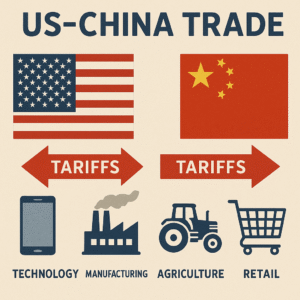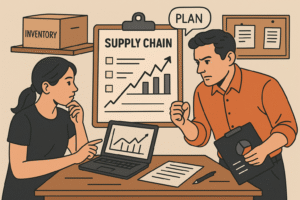Introduction: Why Mark Cuban’s Warning on China Tariffs Matters Now
When Mark Cuban Warns of China Tariffs, people listen — and for good reason. The billionaire entrepreneur, known for his candid takes on the economy and sharp business instincts, recently sounded the alarm about rising tariffs on Chinese imports. As the global economy teeters between recovery and uncertainty, his warning could reshape how businesses, investors, and everyday consumers plan for what’s next.
Tariffs are not just numbers on a spreadsheet — they affect prices at your local store, the cost of running a small business, and the investments in your retirement portfolio. So, what exactly did Mark Cuban say, and why should you care? Let’s break it down.
Who is Mark Cuban? Understanding His Economic Influence
Mark Cuban’s Background as an Entrepreneur & Investor
Mark Cuban isn’t just another TV personality from Shark Tank — he’s a self-made billionaire, owner of the Dallas Mavericks, and an influential voice in tech and finance. Cuban built his wealth by understanding trends early, investing wisely, and speaking out on economic issues that affect millions.
Why His Opinions on Global Trade Hold Weight
Cuban has repeatedly shared bold predictions about market trends, from the dot-com bubble to the rise of AI. His credibility comes from putting his money where his mouth is — whether backing startups or commenting on national policies. When he weighs in on tariffs, he’s not just theorizing; he’s protecting the ecosystem that supports American innovation.

The Current State of US-China Trade Relations
A Brief History of US-China Tariffs
US-China trade tensions aren’t new. For years, both nations have slapped tariffs on each other’s goods — from steel and electronics to agricultural products. Trade talks have often made headlines, but the underlying issues, like intellectual property and market access, remain contentious.
Key Sectors Impacted by Tariffs
Technology and Electronics
Tariffs hit the tech sector hard. Many components for smartphones, computers, and electric vehicles come from China. Increased import costs ripple down to consumers, who end up paying more for gadgets they rely on daily.
Agriculture and Manufacturing
Farmers and manufacturers have long felt the squeeze. Tariffs can limit exports, raise the cost of raw materials, and complicate supply chains. For small businesses already navigating inflation and labor shortages, new tariffs could mean tough choices.
What Did Mark Cuban Warn About China Tariffs?
His Main Message to Businesses & Policymakers
When Mark Cuban warns of China tariffs, he’s urging policymakers to tread carefully. He believes excessive tariffs could backfire — hurting American businesses more than helping them. His key point? Short-term protectionism could stunt long-term growth if companies can’t compete globally.
Possible Consequences of Ignoring the Warning
If Cuban’s warning goes unheeded, businesses may face higher costs, reduced competitiveness, and shrinking profit margins. Consumers could see price hikes on everyday goods — from electronics to groceries — while investors might brace for increased market volatility.
Economic Ripple Effects of Tariffs on American Consumers
How Tariffs Impact Prices and Supply Chains
Tariffs are taxes, plain and simple. Companies often pass these extra costs down the line. A $500 laptop could cost $550 after new tariffs, while delivery delays may become more common if supply chains shift away from cost-effective Chinese factories.
Potential Job Market Shifts
Industries reliant on Chinese imports might cut costs elsewhere — including jobs. Some companies could move operations overseas to bypass tariffs altogether, impacting local employment and tax revenues.
China’s Response: Will They Retaliate or Cooperate?
Official Statements and Economic Moves
China rarely backs down quietly. If tariffs ramp up, expect counter-tariffs or stricter rules on US companies operating in China. This tit-for-tat approach could escalate tensions and shake global markets already on edge from inflation and geopolitical conflicts.
What Should Small Businesses Do Now?
Practical Strategies to Mitigate Tariff Impact
Diversifying Suppliers
Small businesses can’t control tariffs, but they can control how they respond. One smart move? Diversify supply chains. Sourcing products from multiple countries reduces reliance on China and cushions the blow of sudden tariffs.
Revising Pricing & Inventory Plans
Updating pricing models and stocking up on key goods before new tariffs hit can help manage costs. Open communication with customers about price adjustments is crucial for maintaining trust.
 How Investors Are Reacting to Mark Cuban’s China Tariff Warning
How Investors Are Reacting to Mark Cuban’s China Tariff Warning
Market Volatility & Stock Trends
Cuban’s comments stirred conversations on Wall Street. Stocks in sectors heavily reliant on Chinese imports — like tech and retail — often react first. Some investors shift to safer assets or diversify internationally to hedge risks.
Sectors to Watch Closely
Keep an eye on tech, automotive, and agriculture stocks. These industries stand to gain or lose the most from shifts in US-China trade dynamics.
Public Reaction: What Are People Saying?
Reactions from Business Leaders & Analysts
When Mark Cuban Warns of China Tariffs, it’s not just investors who take notice — business leaders and trade analysts quickly weigh in too. Many CEOs share Cuban’s concern that tariffs could squeeze profit margins and force companies to make tough decisions about prices, wages, and supply chains. Economists warn that while tariffs are meant to protect local industries, they often come with hidden costs that ripple through the economy.
Some influential figures in manufacturing and retail have echoed Cuban’s call for smarter trade policies that protect American interests without igniting unnecessary trade wars. Analysts argue that cooperation and strategic negotiation could achieve better results than punitive tariffs alone.
Public Sentiment on Social Media
On social media, Cuban’s comments have gone viral. Small business owners voice worries about how they’ll absorb rising costs. Consumers share frustration over potential price hikes on everyday products. Meanwhile, some commentators argue that tougher tariffs are necessary to level the playing field with China. The conversation is heated, but one thing is clear: people are paying attention.
Possible Long-Term Scenarios for US-China Trade
Is a Trade War Imminent?
Could Cuban’s warning signal the start of a new trade war? Some experts think so. If both countries continue to escalate tariffs, supply chains could be disrupted on a massive scale. This might push companies to relocate operations, alter hiring plans, or pass costs onto customers. In extreme cases, it could even trigger global economic slowdowns.
Opportunities for Resolution
But it’s not all doom and gloom. History shows that diplomatic pressure and negotiation can ease trade tensions. Trade deals, mutual tariff reductions, and new market access agreements are all possible if both sides find common ground. Cuban’s warning might be the wake-up call policymakers need to look for balanced, sustainable solutions.

FAQs: Mark Cuban Warns of China Tariffs
1️⃣ Why did Mark Cuban warn about China tariffs?
Mark Cuban believes excessive tariffs could hurt American businesses and consumers by raising prices and disrupting supply chains, ultimately harming the US economy more than helping it.
2️⃣ How do China tariffs affect the average person?
Tariffs increase the cost of imported goods, which means you may pay more for electronics, clothes, and even groceries. Supply chain delays can also become more common.
3️⃣ What industries are most affected by China tariffs?
Technology, manufacturing, agriculture, and retail are among the hardest hit. Any industry that relies on Chinese imports can see increased costs and operational challenges.
4️⃣ Is there any way for businesses to reduce the impact of tariffs?
Yes. Businesses can diversify suppliers, adjust pricing strategies, communicate transparently with customers, and advocate for favorable trade policies.
5️⃣ What could happen if the US and China can’t resolve tariff tensions?
A prolonged tariff dispute could lead to a trade war, increased market volatility, job losses in some sectors, and higher prices for consumers.
6️⃣ Where can I learn more about the US-China trade situation?
Check reputable sources like The Office of the United States Trade Representative for up-to-date information on trade policies and negotiations.
Conclusion: Staying Informed and Prepared for Tariff Changes
When Mark Cuban Warns of China Tariffs, it’s not just another headline — it’s a signal to pay close attention. Whether you’re a small business owner, investor, or everyday shopper, these tariffs have the power to change your bottom line. Staying informed, planning ahead, and understanding how global trade shifts impact your wallet are more important than ever.
By following Cuban’s lead and thinking critically about the ripple effects of trade policies, businesses and consumers alike can make smarter choices in an unpredictable global economy. After all, foresight is often the difference between thriving and just surviving.